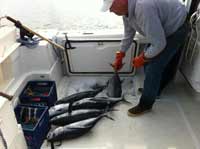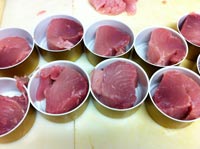Text and photographs by Kathleen Bauer
It’s amazing to imagine what it must have been like to walk along the docks of Oregon’s small coastal towns like Astoria and Warrenton in the first half of the twentieth century. Hundreds of fishing boats would chug into port after spending weeks at sea, their holds full of salmon, tuna and sturgeon. They’d tie up next to the thirty or so canneries that lined the waterfronts and unload their catches, the air filled with the shouting of dock workers and the cry of seabirds looking to scoop up any scraps.
In the 1970s, Oregon’s coastal fishing industry, consisting for the most part of small, family-owned boats, was being devastated by the rise of large foreign fleets competing for ever-decreasing stocks. Seeing the industry changing and the big canneries moving out or closing, Warrenton fisherman Norman Kujala adapted by building his own cannery on the banks of the Skipanon River in 1978.
The Skipanon Brand Seafood is now run by the second generation of the Kujala family, including Paul, who fishes for salmon on the family boat called the Cape Windy, and Mark, who runs the cannery and oversees the processing of salmon, sturgeon and albacore.
They buy most of their albacore from local fisherman who catch the fish one at a time using the hook-and-line method. This type of fishing eliminates by-catch, the unintended harvesting of other species, which has earned the West Coast albacore fishery the certification as sustainable by the Marine Stewardship Council (MSC). Certification has been important, Mark said, “so people can feel comfortable that it’s not depleting large numbers of the species.”
Once the albacore is brought into the cannery, the loins are filleted and cleaned by a small crew who’ve been working for the family for decades. The fresh loins are then sliced, hand-packed into cans with two salt pellets and sent through the ancient canning machine. The wire cage holding the cans is lifted into a large pressure cooker that cooks the fish, which means the fish cooks in its own juice without needing oil or water to keep it moist. Sold at many local grocery stores and at farmers’ markets in Astoria and Beaverton, they’re also developing a growing market in online sales at the Skipanon Brand website.
Reflecting on the changes that have taken place in the decades since his father started their little cannery, he said it still means a lot to the community that families are fishing the waters off the coast. “There’s a lot of pride in fishing,” he said. “It’s still something that resonates with people.”
Kathleen Bauer is a freelance writer in Portland, Oregon, focusing on agriculture and field-to-plate issues. Her blog, Good Stuff NW, is about her journey to connect the dots between what happening in the field and what she’s putting on her table, including stories about people who are making a difference in our local food system, about eating sustainably and locally, and about the political issues affecting the food we find at our markets and stores.
Most of the videos featured on Cooking Up a Story were produced, filmed, and edited by Rebecca Gerendasy. Fred Gerendasy contributed as a writer to many of the posts and occasionally as the interviewer. Visit Rebecca Gerendasy Clay – Art and Fred Gerendasy Photography to see their current work.


